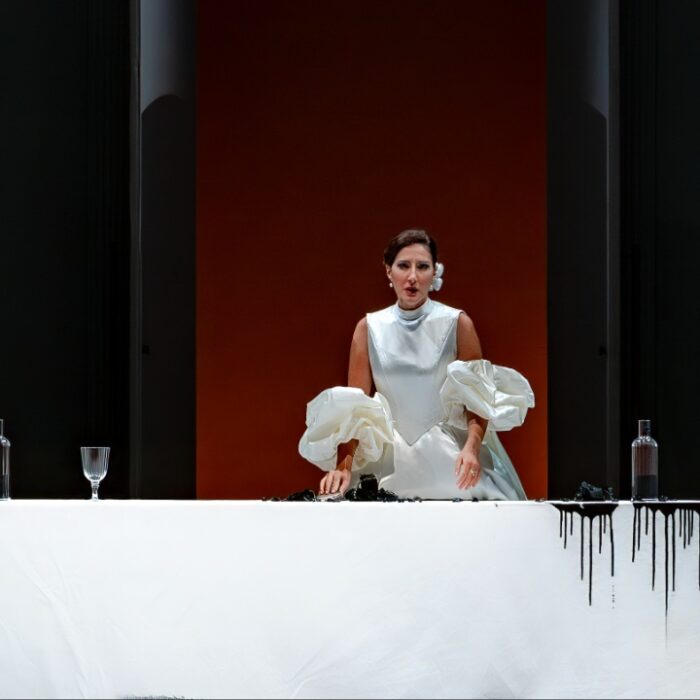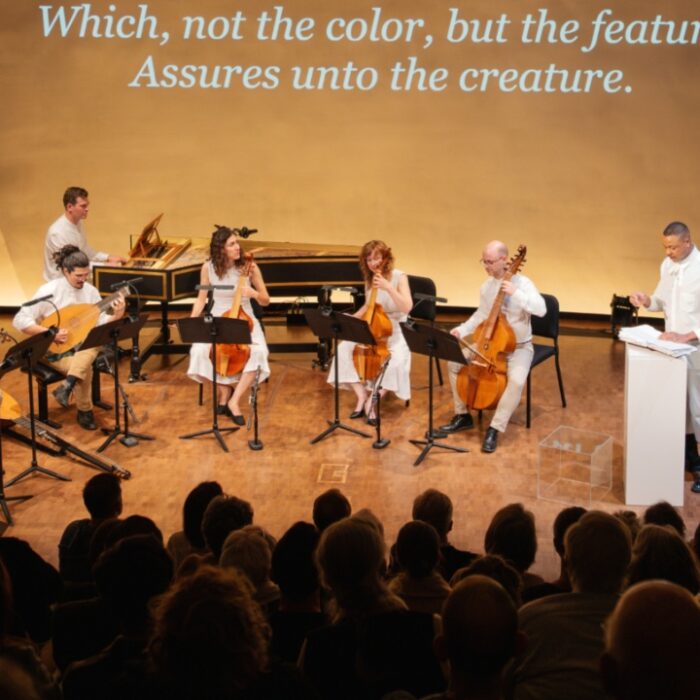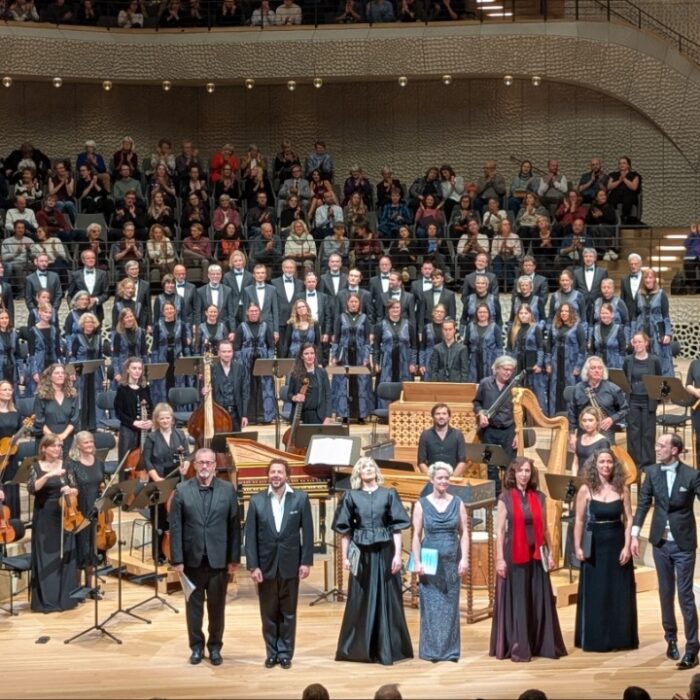
Festival Aix-en-Provence 2025 Review: Don Giovanni
Golda Schultz as Donna Anna & Andrè Schuen as Don Giovanni Give Outstanding Performances in Robert Icke’s New Production
By João Marcos CopertinoThe new Robert Icke staging of “Don Giovanni” might upset more than a few spirits. The scenic proposal is certainly disruptive, and its insistence on intervening digitally in the opera’s soundscape is the most acute symptom of “directivitis” (the terrible disease that has afflicted opera directors for the last seven decades). However, I really had a great time watching “Don Giovanni” in Aix—and it has to do with Icke, it has to do with the cast, and it has much to do with Simon Rattle.
When I left the theater, I was struck by how great and how original the sound that Rattle extracted from the Bavarian Radio Symphony Orchestra was. In many ways, it was a very “symphonic” “Don Giovanni”—all instruments were modern, and they sounded modern. But it was not only that; rarely has a Mozartian orchestra also sounded so beautifully heterophonic. The voice of each instrument was extremely distinguishable from the others—anyone in the house could tell exactly where and how many instruments were playing each note. And then, the impossible happened: while the orchestra was extremely modern, they were also extremely aware of all the historical performance practices that dominate the musical scene. It was as if Rattle managed to find a musical balance between the two trends. His reading of Mozart is not smooth and Apollonian like Currentzis (nor are his singers, for that matter); rather, it is a Dionysian ideal—certainly a reading to remember.
But, my liking of this performance also comes from my understanding that some of its musical strengths were possible only because of Icke’s sober vision for the opera. Usually, we comment on how the stage diminishes the music; few modern directors are capable, on the contrary, of lifting things up, often using the most unconventional methods. Calixto Bieito and Lydia Steier go for shocking but necessarily opulent aesthetics; Claus Guth and Netia Jones go for extraordinarily interventionist new plots over the opera. Icke goes somewhere in the middle. His rereading of the opera certainly goes aggressively against the grain, but it is built on a very attentive reading of the libretto. His aesthetics are, for the most part, austere but effective. With the exception of the filmed elements that clearly belonged in the trash bin, most of his scenic compositions are extremely witty and thoughtful. Moreover, in most cases, Icke does not invent the wheel—many of his ideas were already done somewhere else—but that is not to deny the effectiveness of what he has done.
To enjoy Icke’s direction—and understand what it does to Mozart’s music—one must understand two things: first, that Icke’s intense reading of the libretto will seek the most absurd meanings possible in the text in order to unbalance the drama; second, that we must welcome the illusion that we are seeing “Don Giovanni” as if we did not already know the plot. We are asked to view the opera as if we could see it with new eyes—an evident utopia.
While many people seek the introduction of new elements that are made plausible by the libretto, Icke instead succeeds through the great number of coincidences in which his narrative seems to match Da Ponte’s language—from the very start, when Leporello asks who is alive and who is dead. His theatrical conception does not deny Da Ponte’s text so much as respectfully subvert it by attending to its own language.
The main issue of contention will be, of course, the nature of these plot shifts. Icke merges Don Giovanni with the Commendatore, as if the opera were actually a family drama at the end of Don Giovanni/Commendatore’s life. He is an abusive father to Donna Anna, an unfaithful husband to Donna Elvira, a terrible boss to Zerlina and Masetto—and has no willingness to abandon his vices. The merging of Don Giovanni and the Commendatore is not necessarily new—who can forget Davide Luciano naked, sweeping into white ink—the symbol of the Commendatore—in Castellucci’s Salzburg staging? In fact, next to Catellucci, with whose production this one shared many resemblances, the Englishman’s manages to excuse itself through the good handling of the plot, while the Italian prioritized aesthetics and fragmentation.
As an audience member, what the merging of the Commendatore with Don Giovanni offers me from the very beginning is a completely new appreciation of the intense attachment that all the women feel for Don Giovanni throughout the opera. Their magnetized attachment to such an otherwise off-putting figure is mostly driven by their familial devotion to him. In some cases, things become much more plausible: Donna Elvira continuously returns to Don Giovanni, and her claiming “è mio marito” during the second act Leporello/Giovanni inversion seems more than a happy accident. A similar thing happens when Donna Anna answers Don Ottavio’s admission (at last) that they know who killed off his future father-in-law: her “è mio padre?” comes to seem psychologically charged and conflicted. Even the final moralistic ending seems a bit more complex if we think more and more about the last line: “Questo è il fin di chi fa mal; / E de’ perfidi la morte / Alla vita è sempre ugual.”
Another good thing is the seriousness with which the recitative texts are treated in the opera. Usually, directors seek to imbue some humor into the recitative moments; here, they all feel like moments of discovery and reflection. Until the end of the opera, we cannot fully understand what they will reveal. Leporello, for example, has never been stronger and more aggressive; so too with Masetto. They both seem completely unafraid of confronting their master. The fact that Giovanni is dying from the beginning—since he is also the Commendatore—makes him not less evil, just a pinch less charming—and a lot more pitiful.
The cast of the opera was as good as one can get nowadays. Almost a decade ago, Aix produced a “Don Giovanni” under the direction of Jean-François Sivadier that had a cast of sexy young singers—all of whom have managed to build beautiful careers, especially Eleonora Buratto, Julie Fuchs, and, of course, Philippe Sly. This time, it seems that the cast is mostly formed by very consolidated household names.

(Photo: Monika Rittershaus)
Cast Highlights
Andrè Schuen sings his part exquisitely well, full of stubbornness and vice. He is a very compelling actor, with a voice rich in middle harmonics. For most of the performance, he managed to make a Giovanni who was significantly more vulnerable than usual—though also unwilling to acknowledge it. His gestures weaken more and more during the performance, and even though his instrument is extremely proper, few singers can act as moribund as he does.
He was extremely smooth and seductive in “Deh vieni alla finestra,” especially when he did the ritornello in an impossible pianissimo. He might have been a bit less idiomatic and controlled in “Finch’han del vino,” where his impulsiveness in being heard might have hindered the phrasing. But still, a great Don Giovanni, with much understanding of the character and, most importantly, a proper voice for the role.
Call me biased, but to me, the most exceptional singer was Golda Schultz as Donna Anna. That she is the leading Mozartian soprano this season very few people can deny, but what she does as Donna Anna goes a mile further. Her voice, extremely beautiful, is also extremely flexible in chiaroscuro, making the character extremely layered and complex. Her mid-to-lower range has an uncanny beauty and capacity to express sorrow that few singers can achieve. This last performance is available on France Musique for now, and it is worth listening to if you want to hear her voice alongside Rattle’s orchestra, even if the radio microphones do not do full justice to her voice, which is better captured by her studio recording of some of Donna Anna’s arias. It is a pity, because it feels that she is even better now than she was before. It is true that her staccati at the very end of “Crudele… non dir” were not the most precise of her career, but how many singers can do an “Or sai chi l’onore” with such vividness?
Another shortcoming of the production was not casting a Black or Brown child to play Donna Anna’s child doppelgänger on stage. Although the child actress who performed last night was extremely good in her role, she was white and had long straight hair. In fact, all the women represented on stage as one of the many of Don Giovanni’s conquests were white.
It is particularly comforting to hear Leporello sung by a bass—a real bass—like Krzysztof Bączyk. Fully understanding the bitchiness and sassiness necessary to shape the character in this production, Bączyk created an empowered Leporello, unafraid to confront his master and unapologetic about his own opinions. Although his catalogue aria was executed to perfection, I think the true testament to Bączyk’s art lies in the quality with which he delivered all his recitative lines—taking his own time, owning each word, making the theater much more appealing.
Magdalena Kožená is one of those singers who has nothing to prove in terms of talent. A true veteran on stage who has in the course of her long career achieved almost mythical status, she offers an extraordinary Donna Elvira. It is true that her voice does not have the same silkiness as before; it is also true that she faced some mishaps in “Mi tradì”—especially in the higher notes. But her talents are bigger than that: first, her voice is projecting better and better; second, her legato is still enviable; third, what an actress!
Donna Elvira is, in many ways, the most psychologically challenging character of the opera. It is very easy to portray her as a mere madwoman. By making Elvira the wife of Giovanni/Commendatore, Icke took a risk: were the role given to a lesser performer, Elvira would be a mere aged trophy wife, deprived of morality and uninspiring of empathy. Kožená walks a very thin line, singing the role as a woman seeking to make sense of her own desires and moralities. We are empathetic toward her conflict, and we also understand her own moral struggles. It becomes tangible that she indeed loves—and does not merely desire—Giovanni.
Madison Nonoa was a very compelling Zerlina. At first, I was a bit hesitant about her, given the thinness of her voice during a few recitatives, but her performance in the arias was superlative. Her Zerlina is youthful, sexy, and intentionally human; her voice sounds light, easy, and adept at singing softly and tenderly. In an opera so much about seduction, she might have been the only person truly to seduce someone on stage.
Paweł Horodyski is another revelation as Masetto. A true bass—like Bączyk—Horodyski has a big voice, strong projection in the consonants (especially the “s’s” and “n’s”—so important to the many “sì, sì, sì” and “no, no, no’s” of the opera). His Masetto feels as empowered as Leporello: masculine, correct, and moral. Also, there is nothing ridiculous about him—in fact, his drama is not funny at all.
Clive Bayley was a bit weakened as Il Commendatore—but far from incapable. His dining scene, especially during Schuen’s transformation into Bayley, was extremely compelling, but, perhaps intentionally, lacked the gravitas that we got from the two servant basses. Indeed, it is not a ghost of a patriarch that we see here.
Perhaps the weakest link of the cast was Amitai Pati (brother of Pene Pati) as Don Ottavio. Pati has a lovely voice, with beauty of timbre and much control, but he really lacked the vocal projection necessary for the role, especially taking into consideration that he mostly sang against curtains. Also, his voice seemed a bit insecure in the higher tessitura in “Dalla sua pace” and “Il mio tesoro.” Truth be told, I find it very hard to imagine someone leaving the house to see a “Don Giovanni” just for Don Ottavio—but still, it feels that despite his obvious talents, Amitai Pati still has a ways to go.
I can completely understand those who would prefer a more conventional “Don Giovanni;” I also get that some might prefer an orchestra in a more early-music or smooth manner. But I cannot deny that, whatever problems I saw (and there were more than a few), this production of “Don Giovanni” actually gets it right. And I am more than eager to see an Icke production again—especially if it is done with a great cast and with Simon Rattle at the podium.


